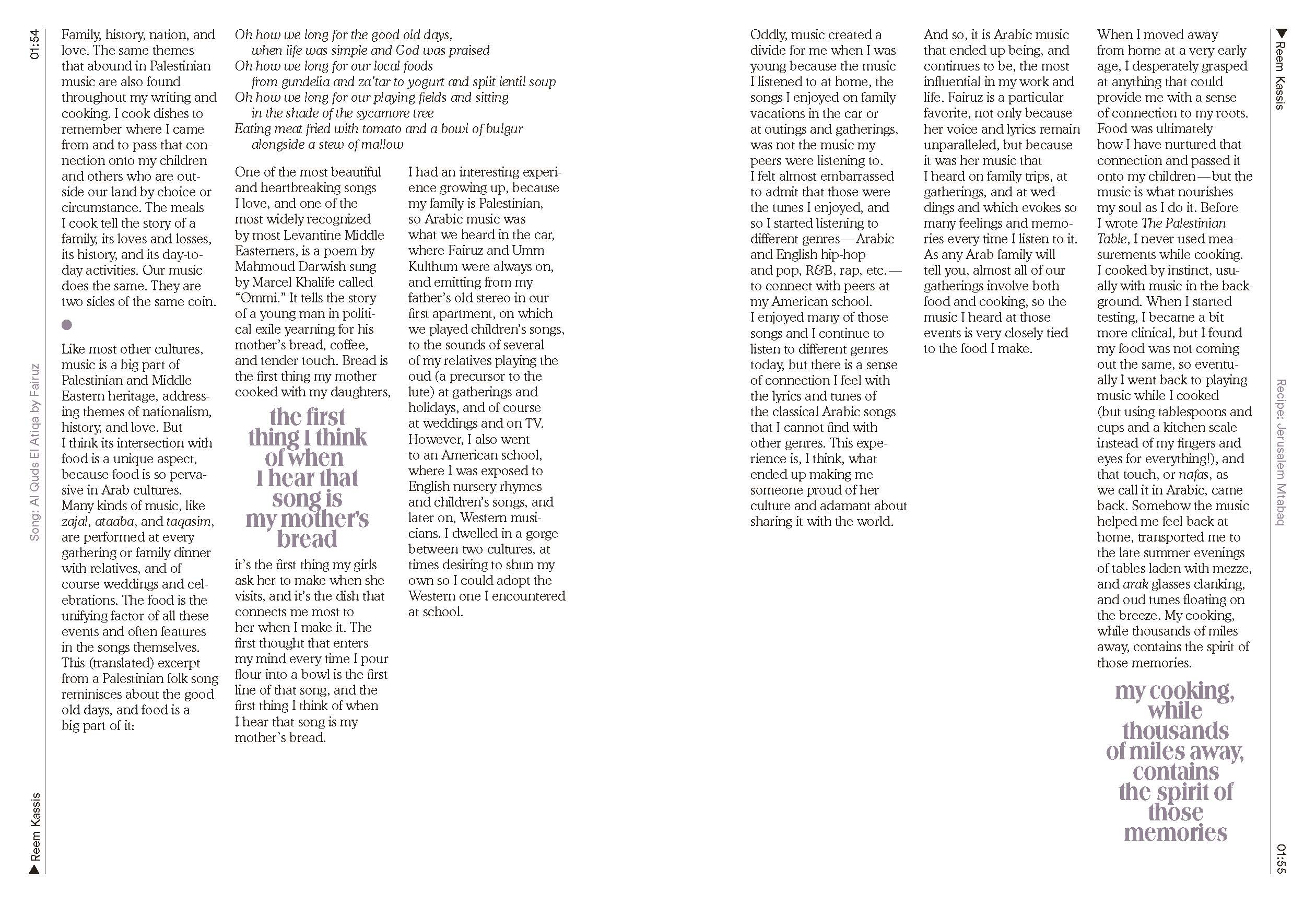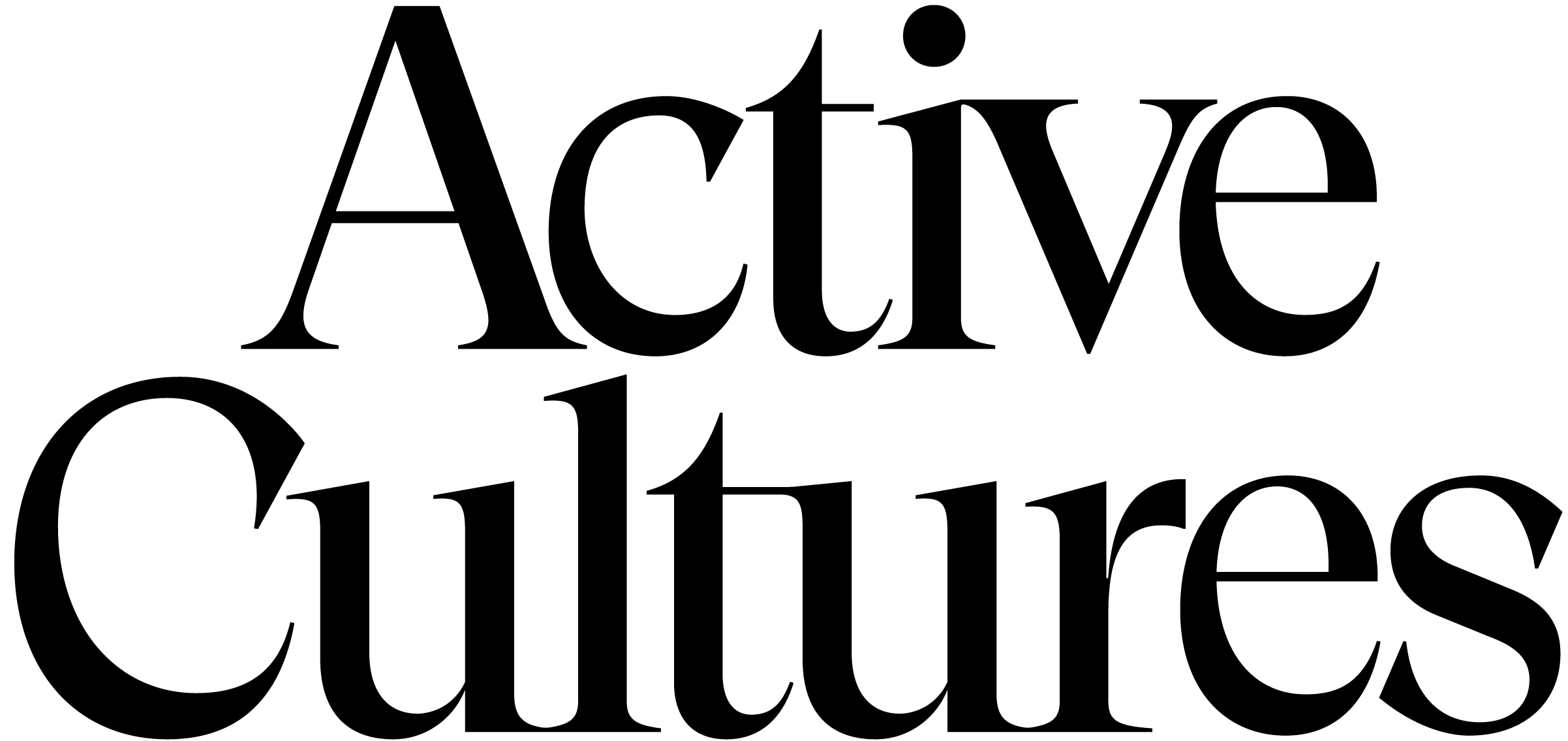Review
Snacky Tunes
Sasha Frere-Jones

"Snacky Tunes"was published in Active Cultures' Digest, Issue 10, July 2021.
Images: Darin and Greg Bresnitz, Snacky Tunes: Music is the Main Ingredient, Chefs and Their Music. Phaidon Press, 2020. Designed by Omnivore.
__
Sasha Frere-Jones is a musician and writer from New York.
Images: Darin and Greg Bresnitz, Snacky Tunes: Music is the Main Ingredient, Chefs and Their Music. Phaidon Press, 2020. Designed by Omnivore.
__
Sasha Frere-Jones is a musician and writer from New York.
There's a playlist in our house called Murder Spa. It exists because, early in 2017, my wife's daughter, Piper, walked into the living room while I was making oatmeal. I was playing William Basinski's Melancholia II, a quiet piece with no drums or pulses marking time. Three piano chords unfold like slowly tumbling gymnasts while a couple of higher notes answer back. This music is watery and damaged. Piper turned to me and said, "It sounds like a spa, but one where you're gonna get murdered."
This, on its own merits, is funny, but this is not why this story matters. What food and music have been for me is more than anything a series of negotiations, a way of connecting with my team, whether it's my band or my co-workers or my family. I thought of this when I was reading Snacky Tunes and came across Palestinian writer Reem Kassis saying, "the songs I enjoyed on family vacations in the car or at outings and gatherings, was not the music my peers were listening to." This reminds me of playing all of my odd experimental music in my wife Heidi's house, an interloper entering a place a family had lived for ten years. All of a sudden, her kids had to understand this strange man with moody loops and vacuum cleaner sounds. That vague music, even though it wasn't a universal hit, was a medium for our family conversation.
I was the only one in my small friend group that liked rap in the early 80s. When we gathered in Flatbush on Fridays to get wrecked on Washington Square Park dirt weed and waste baskets full of Kool Aid and Popov, my buddies wanted to hear Deep Purple. I insisted on playing the tapes of Mr. Magic, recorded the night before during his Thursday (late) night shows on WHBI. Rap was not what my peers were listening to, so I feel Kassis. They tolerated Mr. Magic, though, and eventually decided they were OK with "The Birthday Party" by the Furious Five.
When Daniel Willis talks about Andrew Weatherall making a playlist for The Clover Club and how much love Weatherall put into that task, I think of the time in 1997 when my band, Ui, was in London to record with Stereolab. I was staying with the late Mary Hansen at her flat, pretending I could smoke hand-rolled cigarettes (I barely could) and listening to her play records by The High Llamas, which she insisted were even better than Stereolab. I couldn't hear it at all, but I could love the band as she loved them, and I think of her every time I hear High Llamas records.
Later in Snacky Tunes, chef Bonnie Morales says, "if it were just up to me, I would want silence." I've had sex to music only a few times, and then only accidentally, but I disagree with this stance when it comes to cooking. When I worked at Food Restaurant as a waiter in 1988, the music we played was as important as anything else, a medium for our daily sparring. Our manager, a tall man named Albert, sang the praises of Gail Ann Dorsey's debut album, The Corporate World, years before she became the bassist in Bowie's band. The maître d', Milan, loved playing The Fall's I Am Kurious Oranj during the overwhelming Sunday brunch rushes, which usually ended with some German tourist tipping us pennies on a $200 check and the waitstaff pocketing a third of the bills. When Andrea Carlson talks about her mother taking her to Bowie's Glass Spider tour, I think of the friend who took me to see Shania Twain in 2003, assuming I'd somehow look down on the affair, and all I did was end up realizing she was an even bigger talent than I expected her to be. But music and food usually turn me back to the negotiations and commonalities of family.
![]()
My father, who I lost when I was thirty, used to cook on Saturdays. He was a bit of a drama queen and not the family's main cook. That was, not surprisingly, my mother, an English woman who still makes an exquisite Yorkshire pudding, light and striated and golden. My father would cook something heavy on preparation and chopping and staging, and we'd listen to live opera on WNYC. He would inevitably be moved by something in the music and end his day by crying while cooking. I listen to plenty of classical music, especially the Schubert Trout Quintet that my dad loved, but I rarely listen to operatic singing. And yet every time I chop a red pepper, I hear Dame Janet Baker's rendition of "Ich bin der Welt abhanden gekommen." Mahler's setting of the Ruckert poem is one of the most exquisite things I know, a melody on the same level as Ellington's "Come Sunday" or Depeche Mode's "Enjoy the Silence." When I am chopping, I hear Baker's voice and see my father laughing and wiping his tears with a dish towel, asking me why I never listen to opera. And inevitably, I said, every time, "Dad—we all listen to opera. All of us, every Saturday."
These days, it doesn’t matter what we're listening to in my house, whether Piper is playing SZA or I'm playing some murder spa track that sounds like a Zamboni resurfacing the inside of a cave. The peppers get chopped and my face is all wet and someone is all of a sudden asking me, "What were you hearing?"
This, on its own merits, is funny, but this is not why this story matters. What food and music have been for me is more than anything a series of negotiations, a way of connecting with my team, whether it's my band or my co-workers or my family. I thought of this when I was reading Snacky Tunes and came across Palestinian writer Reem Kassis saying, "the songs I enjoyed on family vacations in the car or at outings and gatherings, was not the music my peers were listening to." This reminds me of playing all of my odd experimental music in my wife Heidi's house, an interloper entering a place a family had lived for ten years. All of a sudden, her kids had to understand this strange man with moody loops and vacuum cleaner sounds. That vague music, even though it wasn't a universal hit, was a medium for our family conversation.
I was the only one in my small friend group that liked rap in the early 80s. When we gathered in Flatbush on Fridays to get wrecked on Washington Square Park dirt weed and waste baskets full of Kool Aid and Popov, my buddies wanted to hear Deep Purple. I insisted on playing the tapes of Mr. Magic, recorded the night before during his Thursday (late) night shows on WHBI. Rap was not what my peers were listening to, so I feel Kassis. They tolerated Mr. Magic, though, and eventually decided they were OK with "The Birthday Party" by the Furious Five.
When Daniel Willis talks about Andrew Weatherall making a playlist for The Clover Club and how much love Weatherall put into that task, I think of the time in 1997 when my band, Ui, was in London to record with Stereolab. I was staying with the late Mary Hansen at her flat, pretending I could smoke hand-rolled cigarettes (I barely could) and listening to her play records by The High Llamas, which she insisted were even better than Stereolab. I couldn't hear it at all, but I could love the band as she loved them, and I think of her every time I hear High Llamas records.
Later in Snacky Tunes, chef Bonnie Morales says, "if it were just up to me, I would want silence." I've had sex to music only a few times, and then only accidentally, but I disagree with this stance when it comes to cooking. When I worked at Food Restaurant as a waiter in 1988, the music we played was as important as anything else, a medium for our daily sparring. Our manager, a tall man named Albert, sang the praises of Gail Ann Dorsey's debut album, The Corporate World, years before she became the bassist in Bowie's band. The maître d', Milan, loved playing The Fall's I Am Kurious Oranj during the overwhelming Sunday brunch rushes, which usually ended with some German tourist tipping us pennies on a $200 check and the waitstaff pocketing a third of the bills. When Andrea Carlson talks about her mother taking her to Bowie's Glass Spider tour, I think of the friend who took me to see Shania Twain in 2003, assuming I'd somehow look down on the affair, and all I did was end up realizing she was an even bigger talent than I expected her to be. But music and food usually turn me back to the negotiations and commonalities of family.

My father, who I lost when I was thirty, used to cook on Saturdays. He was a bit of a drama queen and not the family's main cook. That was, not surprisingly, my mother, an English woman who still makes an exquisite Yorkshire pudding, light and striated and golden. My father would cook something heavy on preparation and chopping and staging, and we'd listen to live opera on WNYC. He would inevitably be moved by something in the music and end his day by crying while cooking. I listen to plenty of classical music, especially the Schubert Trout Quintet that my dad loved, but I rarely listen to operatic singing. And yet every time I chop a red pepper, I hear Dame Janet Baker's rendition of "Ich bin der Welt abhanden gekommen." Mahler's setting of the Ruckert poem is one of the most exquisite things I know, a melody on the same level as Ellington's "Come Sunday" or Depeche Mode's "Enjoy the Silence." When I am chopping, I hear Baker's voice and see my father laughing and wiping his tears with a dish towel, asking me why I never listen to opera. And inevitably, I said, every time, "Dad—we all listen to opera. All of us, every Saturday."
These days, it doesn’t matter what we're listening to in my house, whether Piper is playing SZA or I'm playing some murder spa track that sounds like a Zamboni resurfacing the inside of a cave. The peppers get chopped and my face is all wet and someone is all of a sudden asking me, "What were you hearing?"
